11 November, 2004
Fantastic Wake Up Call!
Temperature: 9*F = windy!
Location: McMurdo Station
What a tremendous start to my day; talking to all my friends back in Rye, New
Hampshire! This morning offered my first chance to make a direct connection
with my students back home. It was so wonderful to hear so many friendly and
familiar voices; I miss everyone! Thank you so much for spending the time to
chat with me! I want to extend a special thanks to Miss Adams for organizing
everything on the Rye Junior High end, and Arlyn Bruccolli and Steve Stevenoski
for organizing everything on the McMurdo/NH end. I also want to thank Brandy
Anglen, Jackie Grom, John Deacon, and Jean Pennycook for being there and
parcticipating in the chat. I am very thankful to have such amazing people in
my life.
My dive this morning was again canceled, so we turned our efforts to getting
everything ready to go to the field. We packed all the remaining items into
the sling load containers, and we transported all the items to the helicopter
pad. This may sound like an easy task, but it gets quite complicated keeping
track of the location of each individual item. Every time we move from one
location to another, weights and cubic dimensions must be reported to the
helicopter crew so they can prepare the proper sling loads. Once we got
everything weighed, packed , and delivered to the helicopter pad, we went to
our meeting at Mac Ops; or McMurdo Operations.
Mac Ops keeps track of where everyone is in the field. We need to report in to
Mac Ops everyday by the designated time, or a search party is initiated. When
we report in, we must state our group project number, how many people are in
our party, and state whether everyone is safe. In order to check in
successfully, we must know which channel to use on the radio, and which
repeater station to use for our parcticular location. Missing check in times is
taken very seriously here in Antarctica; it is nice to know there are people
here in town who are watching out for us.
After our meeting with Mac Ops, Peter and I went to a dive meeting with the
other dive team members and the dive coordinator for Antarctica. We went over
dive protocols for Antarctica and reviewed what we would be doing out in the
field. It was nice to finally get to discuss the gear and the field plan. We
will be using surface supply helmets while in the field, so not even my face
will get wet. I still have not been able to do my dive in McMurdo Sound, but
they are sending me to the field and we will do a check out dive in the field.
I have been told that I will be able to do a dive in the sound when I return to
McMurdo.
Once the dive plans were established, Brandy and I decided to venture over to
Scott Base. Scott Base is the New Zealand equivalent to McMurdo and is only a
few miles away. There is actually a shuttle service that runs between the two
bases, so we took a shuttle. The pressure ridges bulging in front of Scott
Base give some insight into just how squeezed the sea ice can become. In the
picture below, the building seen in the foreground is the common area for the
base; it is quite a large building - check out the size of the pressure ridges!
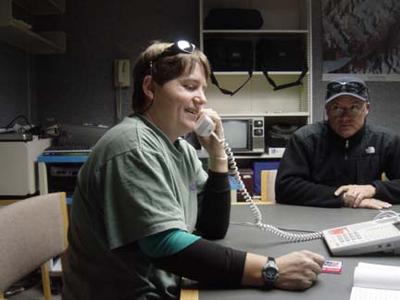
1. Talking to my friends back in NH; John Deaton is in the background.
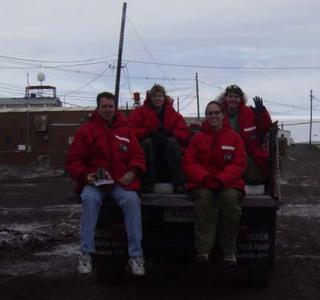
2. Peter, Brandy, Jackie, and I rounding up gear to pack in the truck.
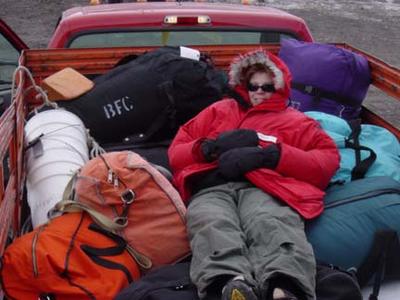
3. Brandy relaxing on a pile of gear going to the field!
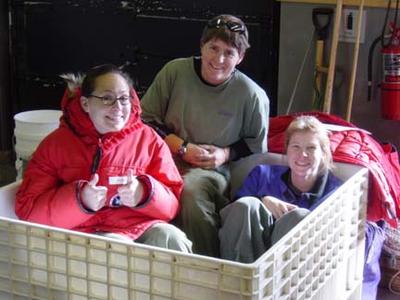
4. Jackie, Brandy, and I (I'm in the center) try to decide if we would prefer to travel in a sling load!
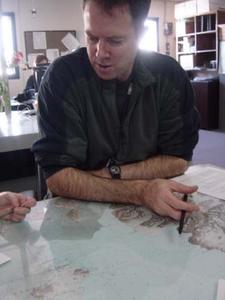
5. Peter reviews the proper "repeater stations" for radio communications with Mac Ops.
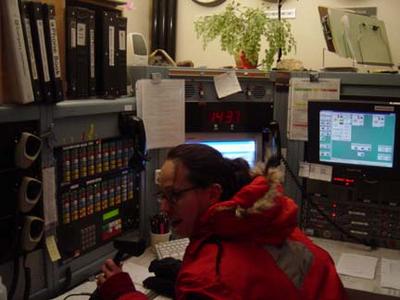
6. Jackie takes over the Mac Ops radio communications; OK - not really!
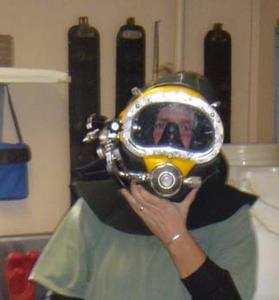
7. Me modeling the "band helmet" we will be using while diving in the lakes!
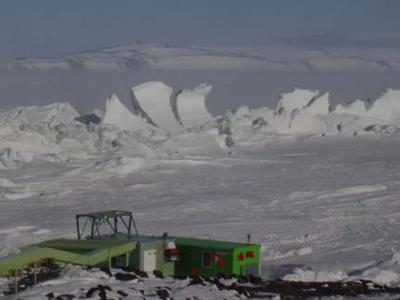
8. The immense sea ice pressure ridges seen at Scott Base.
Contact the TEA in the field at
.
If you cannot connect through your browser, copy the
TEA's e-mail address in the "To:" line of
your favorite e-mail package.
|
